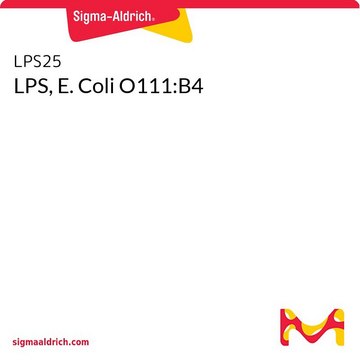L6136
Lipopolysaccharides from Serratia marcescens
purified by phenol extraction
Sinonimo/i:
LPS
Autenticatiper visualizzare i prezzi riservati alla tua organizzazione & contrattuali
About This Item
Prodotti consigliati
Origine biologica
Serratia marcescens
Livello qualitativo
Stato
lyophilized powder
Purificato mediante
phenol extraction
Impurezze
<3% Protein (Lowry)
Colore
white to yellow cast
Solubilità
water: 4.90-5.10, faintly hazy to hazy, colorless to faint yellow or tan
Condizioni di spedizione
ambient
Temperatura di conservazione
2-8°C
Cerchi prodotti simili? Visita Guida al confronto tra prodotti
Descrizione generale
This product is phenol extracted from Serratia marcescens. The source strain is ATCC 21639.
Azioni biochim/fisiol
Lipopolysaccharides (LPS) are localized in the outer layer of the membrane and are, in noncapsulated strains, exposed on the cell surface. They contribute to the integrity of the outer membrane, and protect the cell against the action of bile salts and lipophilic antibiotics.
Nota sulla preparazione
The product is soluble in water (5 mg/ml) or cell culture medium (1 mg/ml) yielding a hazy, faint yellow solution. A more concentrated, though still hazy, solution (20 mg/ml) has been achieved in aqueous saline after vortexing and warming to 70-80 oC. Lipopolysaccharides are molecules that form micelles in every solvent. Hazy solutions are observed in water and phosphate buffered saline. Organic solvents do not give clearer solutions. Methanol yields a turbid suspension with floaters, while water yields a homogeneously hazy solution.
Altre note
To gain a comprehensive understanding of our extensive range of Lipopolysaccharides for your research, we encourage you to visit our Carbohydrates Category page.
Codice della classe di stoccaggio
11 - Combustible Solids
Classe di pericolosità dell'acqua (WGK)
WGK 3
Punto d’infiammabilità (°F)
Not applicable
Punto d’infiammabilità (°C)
Not applicable
Scegli una delle versioni più recenti:
Possiedi già questo prodotto?
I documenti relativi ai prodotti acquistati recentemente sono disponibili nell’Archivio dei documenti.
I clienti hanno visto anche
H Heremans et al.
American journal of respiratory and critical care medicine, 161(1), 110-117 (2000-01-05)
Mice given lipopolysaccharide (LPS) intravenously developed lung edema, which was maximum after 6 h. Tumor necrosis factor, interleukin 12 (IL-12), IL-6, and interferon-gamma (IFN-gamma) appeared in the serum, and levels of nitrogen oxide (NO) derivatives were increased in serum and
Mollie R Sorrell et al.
Journal of insect physiology, 126, 104097-104097 (2020-08-14)
Fragile X syndrome (FXS), caused by a mutation in the Fragile X Mental Retardation 1 (FMR1) gene, is a common form of inherited mental retardation. Mutation of the gene leads to a loss of the gene product Fragile X Mental Retardation Protein (FMRP). While a loss
M G Zenobi et al.
Journal of dairy science, 103(3), 2200-2216 (2020-01-20)
Objectives were to evaluate the effect of prepartum energy intake and peripartal supplementation of ruminally protected choline (RPC) on select indicators of immune status in blood plasma and on lipopolysaccharide-stimulated blood cells ex vivo. At 47 ± 6 d before
Ching-Hua Hsieh et al.
Journal of biomedical science, 19, 69-69 (2012-08-02)
Lipopolysaccharide (LPS) is recognized as the most potent microbial mediator presaging the threat of invasion of Gram-negative bacteria that implicated in the pathogenesis of sepsis and septic shock. This study was designed to examine the microRNA (miRNA) expression in whole
Victor Meseguer et al.
Nature communications, 5, 3125-3125 (2014-01-22)
Gram-negative bacterial infections are accompanied by inflammation and somatic or visceral pain. These symptoms are generally attributed to sensitization of nociceptors by inflammatory mediators released by immune cells. Nociceptor sensitization during inflammation occurs through activation of the Toll-like receptor 4
Il team dei nostri ricercatori vanta grande esperienza in tutte le aree della ricerca quali Life Science, scienza dei materiali, sintesi chimica, cromatografia, discipline analitiche, ecc..
Contatta l'Assistenza Tecnica.

